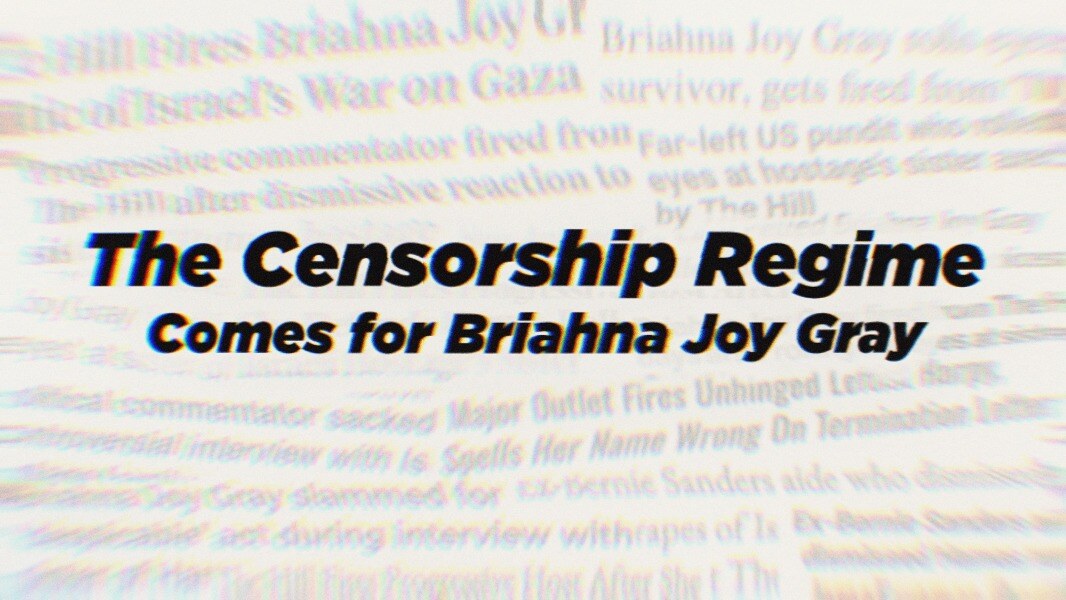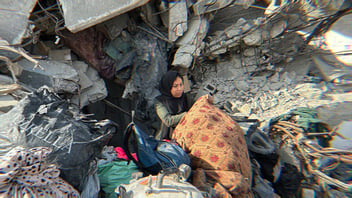The Censorship Regime Comes for Briahna Joy Gray
 Image Description: The Censorship Regime Comes for Briahna Joy Gray
Image Description: The Censorship Regime Comes for Briahna Joy Gray
For years there always felt like there was an unspoken rule in media circles: Don’t talk about Palestine. The silence around the issue of Palestinian rights came into deeper focus following the publishing of an analysis in 2020 that found a stunningly low number of opinion pieces written about Palestinians by Palestinians from 1970 to 2019. Of the 2,490 Op-Ed articles published in The New York Times during that period, for example, only 46 were penned by an actual Palestinian. The discrepancy was even wider in The Washington Post.
And back in 2021, Mondoweiss, an independent site covering issues impacting Israel and Palestine, reported that MSNBC superstar Rachel Maddow had mentioned “Gaza” just six times over the course of a decade—on the supposedly most “progressive” show on cable news.
While the media refrained from even mentioning Palestine, Gaza, the West Bank, or Palestinian rights entirely, a wave of anti-BDS laws was being codified into law, effectively censoring criticism of Israel.
The silencing of Palestinians and the aggressive campaigns to criminalize political dissent made it appear as if Palestinians were unworthy of attention, that criticisms of Israel were untethered to facts, if not expressly anti-Semitic, and that the conflict was far too “complicated” for normies to understand.
Israel’s rampage of Gaza, or what the International Court of Justice (ICJ) deemed a plausible genocide, changed all that—to an extent.
Israel is under more public scrutiny for its actions than perhaps ever before, and multiple international courts, including the ICJ, have issued varying levels of judgments targeted at Israel and its leaders, including the request for an arrest warrant for Israeli Prime Minister Benjamin Netanyahu. Every day citizens and journalists are more comfortable speaking out against the war crimes that have blared across our screens for eight heart-wrenching months.
Among the most vocal critics of Israel on the left has been Briahna Joy Gray, the host of the popular “Bad Faith” podcast and, up until a few days ago, co-host of The Hill’s political news show, “Rising.”
Gray, who has faced massive backlash for her position on Gaza over the last few months, was summarily fired last week following a viral clip of her interview with Yarden Gonen, the older sister of an Israeli hostage being held by Hamas. People are pointing to a particularly tense moment on the show that culminated in what Gray’s critics allege is a dismissive eye roll targeted at a grieving family member.
Gray, in an interview on Glenn Greenwald’s show “System Update,” pushed back at that assertion and suggested her exasperation was related to tension at “Rising.” Gray said the infamous “eye roll” was in response to the “stupidity of my producer for making the choice to have this guest on who very predictably was going to make it into a personal attack about me than about that woman herself.”
The tension at “Rising” had been boiling before last week’s incident. Gray said she had been under intense pressure to “tone down” her coverage of the Gaza genocide, adding that producers unilaterally decided to limit the show to one “Israel” block per show despite viewers’ appetite for such content and various domestic and geopolitical angles related to the conflict.
Gray told the former Intercept co-founder that she felt compelled to respond to what she considered to be Islamophobic comments the guest made about the people of Michigan, which Gonen mentioned in the context of a second 9/11 in the U.S. After a delicate defense of the sizable Muslim and Arab American population in Michigan, Gonen responded by imploring Gray to “believe women,” which seemed to be a reference to Gray’s coverage of the unfounded claim of systemic rape by Hamas on Oct. 7—claims mainstream media outlets have also started to question in recent weeks.
Gray has been particularly aggressive about calling out The New York Times for its mass sexual assault article, which the paper notably left out of its Pulitzer Prize submissions, and its influential in-house podcast has refused to aggregate because of internal concerns.
That Gray was able to speak out against the horrors facing Palestinians as much as she did is a credit to her tenacity as a journalist given the constraints at “Rising.” She told Greenwald that her contract didn’t require her to produce “radars”—demanding and time-consuming video essays—but she did so anyway because it was her way of bypassing the show’s one-Israel-segment firewall.
Gray’s dismissal puts the left on an even more unsure footing than it was before this current conflict. As she admitted to Greenwald, she saw her role at a corporate-controlled outlet as the rare opportunity to provide viewers with a leftist perspective they’d rarely hear on similar networks. And as she tells it, it was her “radars” that generated the most views for the show.
Gray’s not the first progressive “Rising” host to be ousted or leave in the pursuit of more freedom. Katie Halper, another progressive critic of Israel, was fired in 2022 for a “radar” she produced that likened Israel to an apartheid state. Krystal Ball, who helped build “Rising” into one of the most popular political shows on the internet, left to have more independence. Outside of The Hill, Mehdi Hasan was removed in what many considered a direct response to his coverage of the war in Gaza, which included his intense questioning of an Israeli government official over the slaughter of children in Gaza. And before that, you’ll recall Marc Lamont Hill’s firing from CNN following his criticisms of Israel at the United Nations.
The ever-growing list comes as The New York Times recently reported that Israel was engaging in political interference in the U.S. Since last October, Israel has been using hundreds of fake social media accounts and three fake news sites to sway public opinion. Sound familiar?
Anyone who believes this is about an eye roll is critically misinformed. Gray is simply the latest casualty of a censorship war that shows no sign of abating.
Independence—which she now has in spades—is a privilege. But so was the ability for her to give a diverse political audience her unique perspective—potentially moving others away from right-wing or neoliberal rhetoric.
As always, the progressive community’s work just got harder.
Rashed Mian is the managing editor of the award-winning News Beat podcast and co-founder of the newly launched Free The Press (FTP) Substack newsletter. Throughout his career, he has reported on a wide range of issues, with a particular focus on civil liberties, systemic injustice and U.S. hegemony. You can find Rashed on X @rashedmian and on Bluesky @rashedmian.bsky.social.


